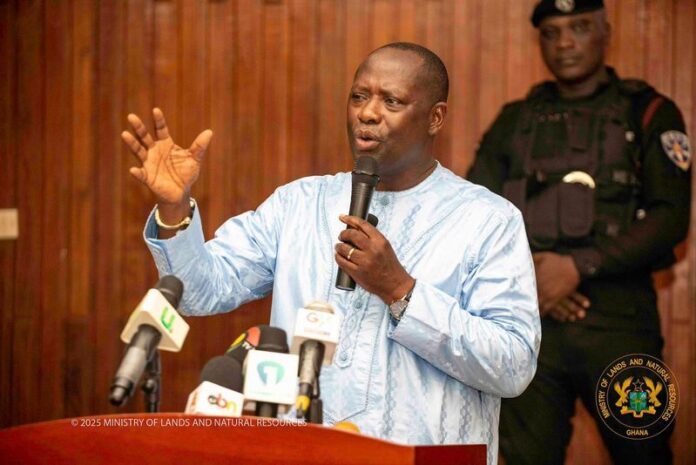The government is set to overhaul the mining policy and adopt a bottom-up approach in the licensing regime to ensure accountability and integrity in the sector.
Minister of Lands and Natural Resources, Emmanuel Armah-Kofi Buah, announced that the government would soon implement fundamental reforms at the Minerals Commission to align with President John Mahama’s vision of resetting the nation’s economy.
Mr. Buah made the announcement during a staff durbar held at the Minerals Commission headquarters in Accra on Monday.
“Let me sound a word of caution: if you’re not ready to align with government’s policy and stand in our way, then you should start walking out right now. Nobody will be a hurdle to our resetting agenda,” the Minister warned.
He further emphasized, “We will not witch-hunt anyone, but if you’re a hurdle to our agenda, we will clear you out of our way.”
The Minister highlighted that Ghanaians had given the National Democratic Congress (NDC) government a mandate to reset the economy towards growth and prosperity, and the government would not allow any obstacles to derail these efforts.
Mr. Buah’s meeting with the staff of the Commission was part of his effort to familiarize himself with the operations and share his goals with them.
“The Minerals Commission is crucial to the country’s economy, and we need to work collectively to ensure success and reset the country,” he stated. “I will work with staff who are dedicated, possess integrity, follow rules and regulations, and are committed to doing the right thing.”
The Minister acknowledged the progress made by the Commission but pointed out that fundamental reforms were needed for the country to fully benefit from its mining operations.
He cited instances where prospecting mining licenses had been issued to individuals who ended up mining indiscriminately on cocoa farms, water bodies, and other sensitive areas, thereby causing significant environmental damage.
“There is something fundamentally wrong with the approach in issuing licenses,” Mr. Buah stated. “We will carry out reforms in the licensing regime by shifting from the top-down approach to a bottom-up approach, where chiefs, District Mining Committees, District Security Commands, the Environmental Protection Authority, the Water Resources Commission, and local communities will be consulted. These groups will provide recommendations to the Minerals Commission after engaging local communities to express their concerns.”
The Minister stressed that mining would be conducted responsibly and sustainably to safeguard the environment and protect livelihoods.
He reiterated the government’s commitment to sanitizing the mining sector and urged the Commission’s staff to align with its policy direction for the benefit of the nation.
Mr. Buah also highlighted the government’s resolve to revamp the Ghana Geological Survey Authority to enhance geological investigations of mineral-rich areas.
He believed the reforms would include responsible and sustainable mining as key performance indicators (KPIs) for district chief executives across the country.
In his welcome remarks, Mr. Martin Ayisi, the Chief Executive Officer of the Minerals Commission, revealed that gold earnings contributed US$11.5 billion to the country’s export receipts in 2024. Of this, US$4.6 billion came from the small-scale mining sector, with gold alone constituting 56.3 percent of the country’s total export earnings.
ALSO READ:

